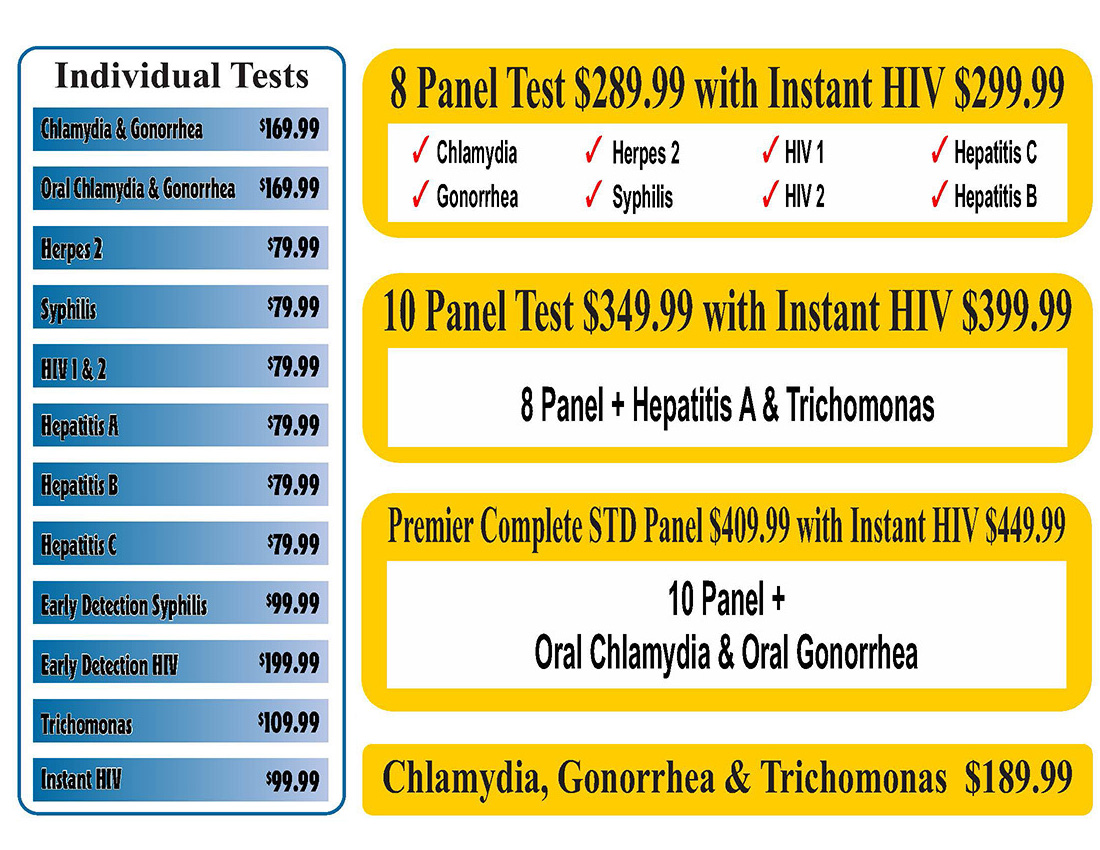
CALL NOW FOR SAME DAY TESTING IN THE LAS VEGAS AREA 702.800.2723



A Very Discreet, Private STD Clinic
|
Our private clinic is staffed with discreet and professional Board Certified Clinicians, Licensed Registered Nurses, and Medical Assistants and is supervised by Board Certified Physicians.
We provide complete, fast, reliable, and affordable STD testing. All laboratory testing is drawn in our office, which provides clients the convenience of having their laboratory testing, consultations (if requested), and treatment all performed at the same location.
Our friendly and professional staff can answer all of your questions regarding STD testing. We can also provide a full consultation with a clinician (with an appointment) before and/or after your testing, if you wish. Our clinicians can offer you treatment options, if needed.
Why go to a STD clinic where you can’t also get treatment? We provide both testing and treatment.
In addition, we carry vaccines that can help prevent certain STDs such as:
- HPV Vaccine
- Hepatitis B Vaccine
- Hepatitis A Vaccine
All our locations are located in storefront clinics in retail shopping centers, so often you can park right in front of our clinic.
Hepatitis B
What is Hepatitis B?
Hepatitis B infection is a contagious liver disease caused by a virus. Hepatitis B can cause mild illness lasting a few weeks ranging to a serious, lifelong illness. Hepatitis B is transmitted by blood or body fluid. This can happen during sexual contact, sharing needles, or to a baby from an infected mother.
Hepatitis B can cause a short-term illness that sometimes resolves. Other times it turns into a chronic infection that can result in long-term health problems.
Who is at risk?
Hepatitis B is most commonly spread through sexual contact. Anyone can get Hepatitis B, but those at greater risk are those who:
- Have sex with a Hepatitis B infected person
- Have more than 1 sex partner or unprotected sex
- Already have other STDs
- Exposed on the job (health-care workers)
- Travel to high risk parts of the world
- Hemodialysis patients
What are the signs and symptoms of Hepatitis B?
New or acute Hepatitis B infection may or may not have symptoms. Symptoms can last a few weeks to as long as 6 months. If symptoms do appear, they can include:
Fever |
Fatigue |
Loss of appetite |
Nausea and/or Vomiting |
Abdominal pain |
Dark Urine and/or Clay-colored bowel movements |
Joint pain |
Jaundice (yellow color in the eyes or skin) |
Chronic Hepatitis B can remain symptom free for a long as 20 to 30 years. Some people infected with Chronic Hepatitis B will develop liver cirrhosis or liver cancer. That is why testing is important to prevent the chronic changes of the infection.
Testing
All patients who are concerned about exposure to STDs or have been diagnosed with other STDs should also be tested for Hepatitis B.
Hepatitis B can be tested with a simple blood test. The test will look at the presence of antibodies or antigens and help determine if there is acute or chronic Hepatitis B infection. In addition, there are tests that can check if you have immunity to Hepatitis B from previous vaccination.
Treatment
Treatment may vary depending on if the Hepatitis is acute or chronic. Acute Hepatitis B usually includes rest, adequate fluids and nutrition, and sometimes hospitalization. Chronic Hepatitis B treatment is usually under the care of a specialist in that field such as a gastroenterologist or liver specialist. There are several drugs approved for Hepatitis B treatment, and new treatments in development. Treatment varies and is tailored to each individual.
Important care for people with Hepatitis B includes avoiding alcohol and checking with a health care professional before taking any new supplements or medications.
Prevention
Hepatitis B can be prevented. The Hepatitis B vaccine is the best way to prevent the disease. Anyone who wishes to be protected from Hepatitis B infection should have the vaccine. This vaccine is given in a series of 2-3 shots and should be considered for:
- All infants and children and adults up to age 59
- Sexually active persons who are not in a long-term, monogamous relationship
- Persons who have a sex partner who has Hepatitis B
- Men who have sex with men
- Injection drug users
- Health care and public safety workers who may come in contact with blood or body fluids
- People with end-stage kidney disease
- Travelers to certain parts of the world with high rates of Hepatitis B
- People with chronic liver disease
- People with HIV
Hepatitis C
What is Hepatitis C?
Hepatitis C infection is a contagious liver disease caused by a virus. It is the most common chronic blood borne infection in the United States. Hepatitis C is poorly transmitted sexually, and more commonly transmitted by injection drug use, history of blood transfusion, tattoos, or being born to an infected mother.
Who is at risk?
- Injection drug users
- Persons who live in correctional facilities
- Persons who have been diagnosed with other STDs such as HIV
- Health care workers who may be exposed to blood or bodily fluids
- Persons born between 1945-1965
- Persons who received blood transfusion or organ transplant before 1992
- Sexual exposures can result in transmission of HCV, although much less frequent
What are the signs and symptoms?
New or acute Hepatitis C infection may or may not have symptoms. If symptoms do appear, they usually occur 2-26 weeks after exposure. Symptoms of acute Hepatitis C may include:
| Fever | Fatigue |
| Loss of appetite | Nausea and/or Vomiting |
| Abdominal pain | Dark Urine and/or clay-colored bowel movements |
| Joint pain | Jaundice (yellow color in the eyes or skin) |
Most persons with chronic Hepatitis C infection have no symptoms. However, it is possible for chronic Hepatitis C infection to progress to cirrhosis and liver cancer.
Testing
Hepatitis C can be tested with a simple blood test. The initial blood test looks for the presence of Hepatitis C antibodies. Further testing should be done if antibodies are present to determine what treatment should be provided. HCV can be detected 4-10 weeks after infection with antibody testing, although may take up to 3-6 months to detect. There is a test that can detect as early as 2-3 weeks after infection called HCV RNA. This test is more costly than the Hepatitis C antibody test.
Everyone born between the years 1945-1965 should be tested due to a higher risk of transmission during that period.
Treatment
Hepatitis C treatment should be managed by a health care specialist such as an infectious disease physician, gastroenterologist, or hepatologist (liver specialist). New treatments are in the process of development. Currently treatment is a combination of medications that suppress the virus and attempt to decrease the amount of the virus in the body.
Important care should be taken including avoiding alcohol and checking with a health care professional before taking any new supplements or medications.
Prevention
It is important that patients with Hepatitis C be vaccinated against Hepatitis A and B to prevent further complications.
Patients with HCV infection should not donate blood, organs, or tissues. They should also not share razors or toothbrushes. It is important to notify sex partners to be tested and treated if needed.
Don’t wait until tomorrow when you need answers today.
One in every five people in our country has contracted a Sexually Transmitted Disease. According to the Center for Disease Control (CDC) there are 20 million new infections in the United States every year. Do not become a statistic; know the facts about Sexually Transmitted Diseases.
Most Sexually Transmitted Diseases have little to no warning signs or symptoms; the only way to know for sure is by testing. If symptoms are present it might be more serious than you think. Symptoms can vary greatly including but not limited to:
- Dark color or heavy odor in urine
- Discharge from genitals
- Abnormal spots or rash
- Burning during urination
- Bumps, warts or blisters on genitals
- Pain during sex or urination
Sexually Transmitted Diseases have many misconceptions as they have no discrimination as to sex, race, age, sexual orientation or religion. The facts are simple: Sexually Transmitted Diseases are transmitted by sex regardless of mode of transmission (i.e. oral, anal, or vaginal). The only fool proof way to avoid a Sexually Transmitted Disease is through abstinence. STDs can still be spread even with the use of a condom. Get tested and do it often so you do not spread what can be prevented.
There are billions of dollars spent in the United States health care system each and every year in the treatment of Sexually Transmitted Diseases. Prevention and testing are necessary to prevent possible lifelong chronic health issues. What is your piece of mind worth?
Vegas STD Testing offers discrete, private and confidential testing for Syphilis, Chlamydia, Hepatitis, Herpes, Gonorrhea, and HIV/AIDS. Our highly trained staff is here to ensure all privacy laws and HIPAA regulations are followed. You are much more likely to contract HIV when one or more STDs are already present. Even after treatment, there is no guarantee that a Sexually Transmitted Disease is gone without retesting.
Vegas STD Testing has two locations to serve you in the Las Vegas Valley, both with convenient freeway access. Our Northwest location is in the Rainbow Promenade across from the Best in the West Shopping Center off of Lake Mead and US-95. Our Southwest location is on the corner of Windmill and Bermuda, minutes away from Blue Diamond and I-15. We are here to serve you five days a week Monday through Friday from 9:00 am to 5:00 pm. Payments are due at the time of testing. For your convenience, we accept cash, Visa, Master and debit cards. No appointment is necessary. Walk-ins are always welcome at both of our locations.
Other Services We Provide
- All Vaccines Available In The U.S In Stock Everyday *(excluding the COVID-19 vaccine)
- Complete Blood Testing
- Drug Testing
- TB skin Testing
- Employment Physicals
- Chest X-Rays
- EKG’s
- Cholesterol Screenings
- Glucose Screenings
- Blood Pressure Screenings
- Body Composition Analysis
- Pulmonary Function Testing
- Audio-metric Testing
- Vision testing
